Dental Crowns Richmond
Make Your Damaged Tooth Feel Like New
Here at Brown, Reynolds, Snow, LeNoir Dentistry, we see many patients with severely decayed or broken teeth. To build these teeth back up and help them function like normal, we often recommend dental crowns in Richmond, VA. Once your crown has been placed, it should feel just as natural and pain-free as any other tooth. Want to learn whether you could benefit from a dental crown? Continue reading below, and contact our office when you’re ready to schedule your appointment.
Why Choose Brown, Reynolds, Snow, LeNoir Dentistry for Dental Crowns?
- Metal-Free, Tooth-Colored Materials Used
- In-Network with Several PPO Dental Insurance Providers
- Same-Day Dental Appointments for Emergency Patients
What Is a Dental Crown?
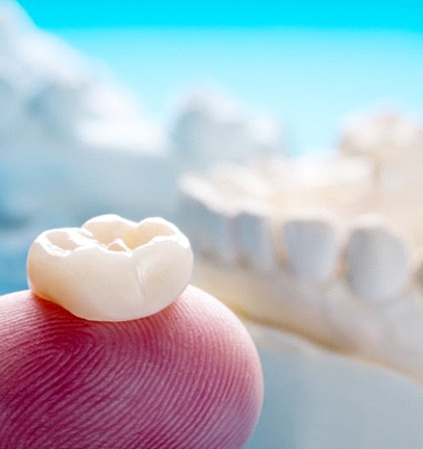
A dental crown is essentially a hollowed-out “cap” that fits over the entire section of a tooth above the gumline. As one of the most versatile dental treatments, a crown can fulfill several purposes, such as:
- Repairing a tooth with a large cavity
- Holding the pieces of a fractured tooth together
- Protecting a weakened or worn-down tooth from further damage
- Covering up a discolored, short, or otherwise cosmetically flawed tooth
Dental crowns can be crafted from various materials, and we may recommend a particular type based on the location of the tooth being treated. For teeth near the back of the mouth, our dentists might suggest a durable crown made from gold or other metals. For teeth that are visible in the smile, we often recommend all-porcelain crowns, which are carefully designed to match the surrounding teeth and appear seamless.
The Dental Crown Process
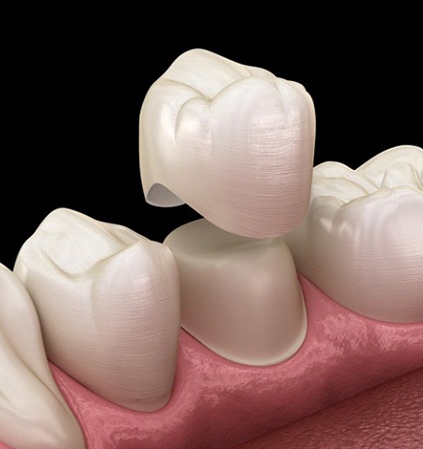
Not counting your initial consultation, getting a dental crown normally takes two appointments. Part of the first visit involves your dentist in Richmond carefully shaving off a thin layer of enamel from the tooth in question. This step ensures there is plenty of room for the crown without throwing off the balance of your bite. Next, we capture detailed impressions of that tooth and the nearby area, which we send to a trusted dental lab. The team at the lab gets started on fabricating your crown to our exact specifications.
While the lab works, you’ll wear a temporary crown to keep your tooth safe. It should only take a few weeks for the permanent crown to arrive at our office, at which point you’ll return for your second appointment. After verifying that your crown is a perfect fit, our dentists will cement it onto your tooth.
The Benefits of Getting a Dental Crown

If you’re still on the fence about getting a dental crown, consider some of the benefits they offer, which include:
- They can protect a vulnerable tooth from damage, potentially saving a tooth from needing to be extracted entirely.
- You’ll be able to chew effortlessly and comfortable with that tooth again.
- With the right care, a dental crown can easily last for a decade or longer.
- Dental insurance providers are often willing to cover 50% or more of the cost of a crown.
- In the case of porcelain crowns, they’re designed to blend right in with your smile as a whole.
Understanding the Cost of Dental Crowns
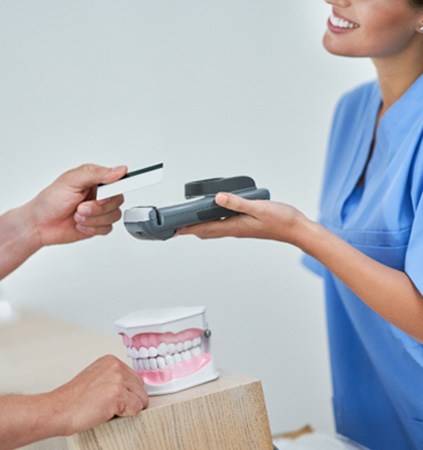
Learning you need to get a dental crown in Richmond can be overwhelming, especially when you’re unsure of how much the procedure will cost. Our team at Brown, Reynolds, Snow, LeNoir Dentistry will help you along every step of the way, from providing you with a detailed cost estimate so you know what to expect, to helping you navigate our multiple easy ways to pay.
Factors That Affect the Cost of Dental Crowns
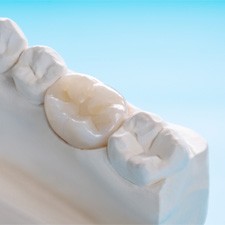
No dental crown is one-size-fits-all. In fact, each one is customized based on the shape and color of your tooth, and the aesthetic feel and durability that you’re looking for. These can all play a role in the overall price of your restoration, along with the following factors:
- Additional Treatments: In some cases, having a dental crown placed is the last step of a treatment. If you require a root canal, dental implant placement, or other preliminary procedures before getting your crown, they will incur separate costs.
- Materials Used: Crowns can be made from a variety of dental materials, including natural-looking ceramic and porcelain, as well as metals. In most cases, patients opt for the durable, yet aesthetically pleasing materials because they’ll blend-in with the smile, all while providing trusted protection.
Does Dental Insurance Cover Dental Crowns?

In most cases, dental insurance plans will cover at least a portion of the cost of getting a dental crown, typically around 50 percent of the overall price, so long as it’s deemed medically necessary. Plus, when you visit our practice, you’ll be able to maximize your coverage if you’re in-network with us. We’re partnered with numerous major PPO dental insurance providers and are happy to file claims for those who are out-of-network as well.
Options for Making Dental Crowns More Affordable
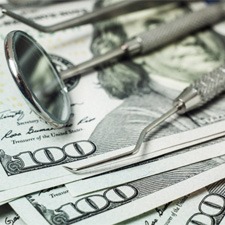
In addition to providing in-network savings, our practice also offers multiple additional flexible ways to pay:
- Our In-House Dental Membership Plan: Our in-house plan is an excellent option for those who are uninsured. For a flat annual fee of $424 or $474, you’ll receive coverage for two professional checkups and cleanings, fluoride treatments, and necessary X-rays. You’ll also get a 15 percent discount on any other services that you’ll need during the year, including cosmetic and restorative procedures, Invisalign, and dental implants.
- Additional Financing Through CareCredit: Patients who are uninsured or underinsured can also benefit from our partnership with CareCredit , a trusted, third-party financer. They offer low monthly payment plans that can fit into virtually any budget, plus they come with little-to-no interest attached!
Dental Crown FAQs
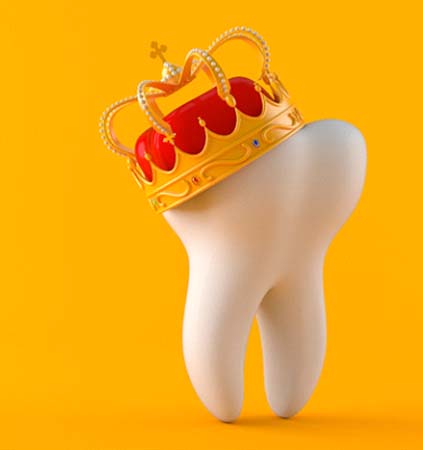
Have you been told that you’re in need of a dental crown? You may still have some unanswered questions about the treatment process and how it works, so we’re here to help. Here are the answers to some of the most common queries we receive about dental crowns in Richmond. If you don’t see the information that you’re looking for below, don’t worry. Give us a call , and we’d be happy to explain more about the procedure so that you know what to expect.
Are Dental Crowns Permanent?
Dental crowns aren’t technically permanent because they will eventually need to be replaced. However, they are considered to be a long-term solution. On average, they can protect your tooth from anywhere between 5 to 15 years. When your dentist reshapes your tooth for a crown, that procedure is irreversible because tooth enamel cannot grow back once it has been lost. That tooth will always need to be protected by a crown going forward. Remember that crowns are meant to protect the underlying tooth from additional damage, so it helps the tooth to survive for much longer than it likely would have otherwise.
Do Dental Crowns Get Cavities?
It is impossible for a dental crown itself to get a cavity. However, the tooth underneath it still can. In fact, a crowned tooth has about the same risk of decay as an uncrowned tooth. Poor oral hygiene makes it possible for bacteria and plaque to form around the gumline where the tooth meets the crown. They can then travel beneath the crown and wreak havoc on the underlying tooth. Fortunately, you can prevent cavities in crowned teeth the same way you would for any other tooth. Brush, floss, and see us for regular checkups.
Does It Hurt to Get a Dental Crown?
Just like when you get a filling, your dentist will numb the tooth that they’re working on when you get a crown. While you shouldn’t feel any discomfort during the procedure itself, you may experience some sensitivity for a few days afterwards. Fortunately, this is mild and temporary, so it can usually be managed with over-the-counter pain relievers. If discomfort worsens, give us a call so we can help.
Do Dental Crowns Feel Natural?
Within a few days of receiving your permanent crown, it should start to feel increasingly natural. Crowns are made from durable materials that can stand up to everyday chewing forces just as easily as tooth enamel, so eating with a crown shouldn’t feel strange. The reason your dentist reshaped your tooth and tooth impressions was to ensure it would fit perfectly in your mouth. Your crown shouldn’t feel awkward or even noticeable.
How Do You Know When a Dental Crown Needs to Be Replaced?
The only way to know for sure whether a crown needs to be replaced is to have X-rays taken or have it visually examined by your dentist. That being said, here are some of the warning signs that could indicate that you may need a new crown soon:
- Pain: If there is decay underneath the crown, it will need to be removed, and the underlying tooth needs to be treated. Then, it will be determined if the crown can be reseated or if you need a new one.
- Instability: Contact us if your crown is loose. This will need to be repaired.
- Poor Appearance: If your crown is chipped or discolored, this is a valid reason to have it replaced.
- Dark Line: With porcelain fused-to-metal crowns, the dark, metal portion can be revealed over time. You may need and/or want to have this replaced.
What Happens If You Wait Too Long to Get a Dental Crown?
Your dentist will only ever recommend a dental crown is you really need one. While you may be tempted to put off the procedure, it is best to schedule it right away if your dentist has suggested it. Waiting too long to get a crown will leave the tooth exposed to chewing forces, food debris, and bacteria, ultimately worsening the existing issue. Eventually, you could end up needing a root canal or extraction. To preserve as much natural tooth structure as possible, you should get a dental crown as soon as it’s recommended.
Can Dental Crowns Be Whitened?
Dental crowns cannot be whitened like your teeth can. This is because tooth enamel has tiny pores through which whitening gels can enter and break apart stains, but dental restorations, like crowns, do not. Metal-free dental crowns are designed to blend in with your surround teeth as closely as possible, and they are stain-resistant. You shouldn’t have to worry too much about your crown becoming discolored over time.
Is It a Dental Emergency If Your Crown Falls Off?
Losing a dental crown isn’t an urgent dental emergency, but you should still call your dentist and schedule an appointment within a few days. The only time you’d need to be seen right away is if the underlying tooth has sharp edges that could harm the soft tissues in your mouth. Until your visit, place a piece of dental wax or sugar-free gum over the area for protection. Even if it doesn’t hurt, it’s still important to have your restoration reseated or replaced to prevent the underlying tooth from enduring further damage.
